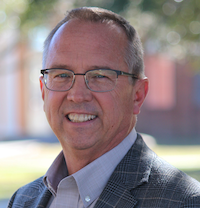Richard Elligson
Richard Elligson earned a PhD in Theology from Mid-America Baptist Theological Seminary. Archives

Richard Elligson earned a PhD in Theology from Mid-America Baptist Theological Seminary. Archives
Session 6
April 7, 2024
THE MISSION OF JESUS SHARED
Luke 24:44-53
With the end of redemptive history completed on earth, Jesus ascended to His rightful (and original) place at the right hand of the Father. The Bible pictures Him “seated” there in fulfillment of the Scriptures. It is a place of rest from His redemptive work and a place of reigning over His redeemed kingdom. But He won’t stay seated there forever…for His second coming is as certain as His first! And while His redemptive work on earth is done, ours is not. The Great Commission is exactly that. With eternity in the balance, taking the gospel of salvation to the world is both the greatest of all challenges and the most meaningful of all activities. It is also a sacred duty. In Luke’s account, these last words of the Lord are neatly divided into four W’s.
Words (vv. 44-45). Here at the end of His earthly ministry, Jesus’ words are particularly packed with meaning. Each detail is included for a reason. Verse 44 reveals the origin of Jesus’ teaching. They are His words, proclaimed over the 3 years that Jesus was with them. But more than that, they were His words prophesied throughout the entirety of Scripture. The Law, the Prophets, and the Psalms (or “Writings”) represent the three classical divisions of the Hebrew Old Testament. By fulfilling them all, Jesus was once again declaring that His redemptive work on earth was done (see Matt. 5:17). Verse 45 is interesting. Just as Jesus opened their eyes to recognize Him (see John 20:11ff; Luke 24:31), He opened their minds to understand the Scriptures, specifically as they related to His fulfillment of the messianic prophecies. For reflection: We tend to think of understanding the Scriptures as a spiritual discipline. What does verse 45 say about the role of our minds as well?
Written (vv. 46-47). “He also said to them…” indicates a change in context. Whereas He had already fulfilled the messianic texts, here He emphasized His messianic task. The simple gospel recorded in the Bible consists of the good news of Christ’s sacrificial death, which included both the payment for sin and the satisfaction of God’s judgment (hence He “would suffer”) according to the Scriptures; His burial; and His resurrection on the third day, according to the Scriptures (see 1 Cor 15:3-4). That’s the message in verse 46. Verse 47, then, gives the mandate: repentance was the requirement for forgiveness of sin. Earlier, Jesus had proclaimed, “Unless you repent, you will all perish” (Luke 13:3). The method for spreading this good news? Proclamation! Paul stated it clearly: “Faith comes by hearing, and hearing by the word of God” (Rom. 10:17). Finally, the intended audience for the good news is “all nations,” starting exactly where they were…. Jerusalem. For reflection: I know there are dozens of ways to share the gospel (and I have tried them all!). But no better way exists than to sit down one-on-one with a person and share the gospel directly from the Bible. Are you ready, willing, and able to do just that?
Witness (v. 48). The term “witness” is usually used in a legal context. Simply put, a witness is someone who can testify directly and personally to what he or she has seen, heard, or experienced. Jesus’ pointed out that the only ones capable and credible when it comes to sharing the gospel, are those who have personally experienced the salvation that Jesus gives. The good news about that is that no special training or special gifts are necessary to share about Christ. One only needs a legitimate salvation experience with Him. The challenging news is that we are ALL “witnesses of these things.” Hence, we are ALL as responsible to share the gospel as the original disciples! For reflection: If we are saved and we are responsible for sharing Christ with “the nations,” why do you think so few people actually do it?
Worship (vv. 49-53). With the promise of the Holy Spirit’s empowerment (see Acts 1:8), the witnesses were blessed by Christ personally, who then ascended personally into heaven. What followed would set the stage for the early church’ major activity: worship. Notice that they were filled with worship, joy, and continual praise. But notice as well where they were gathered: in God’s house. This meant that gathering together corporately for worship was an integral part of the early church’s life. For reflection: Read Heb. 10: 25. How does that verse inform our study? What does it say about believers’ failure to gather?
Session 5
March 31, 2024
THE RESURRECTION OF JESUS
Luke 24:1-8; 38-43
Hebrews 11:1 teaches us that “faith is the substance of things hoped for and the evidence of things not seen.” But that doesn’t mean that faith is some kind of blind leap in the dark! Rather, our faith is based on evidence. As a historian, Luke was mindful of recording the facts surrounding Jesus’ life and His death. And He was equally dedicated to recording the facts about the resurrection. In fact (no pun intended!), Christ’s death, burial, and resurrection are so central to the gospel of salvation (see 1 Cor. 15:3-4) that nothing short of certainty will do. In this week’s lesson, three evidences of the resurrection are mentioned, all of which point to the fact that Jesus rose again.
The testimony of Jesus’ absence (vv. 1-6). Luke’s account of Resurrection Morning focuses on the actions of the dedicated women who followed the Lord. First, they “came” and they “brought” (v. 1). The remaining details explain the context. It was the first day of the week (Sunday), and it was sufficiently early that it was still dark (John 20:1). After the burial tradition of the Jews, spices had been brought that were prepared prior to the sabbath (Luke 23:56). While a large quantity had been applied by Nicodemus at the garden tomb (see John 19:39), this did not preclude the ladies from following through with their own act of devotion. Next, they “found” and they “didn’t find” (vv. 2-3). What they found was the stone rolled away from the tomb. What they did not find was a body inside! Third, the women “bowed down;” not at the sight of the Lord, but at the sight and subsequent terror of seeing His messengers waiting in dazzling white (v. 5). Notice that all of the evidence presented by the ladies’ actions indicate that Christ really had died, that He really was buried, and that He really was no longer dead in the grave. Then, these facts were confirmed by the angels’ frank proclamation, “He is not here, but is risen!” For reflection: Read 1 Cor. 15:3-4. We all know how important Christ’s death is in God’s redemptive plan. But why do you think His burial and resurrection are also essential elements of the gospel?
The testimony of Jesus’ promise (vv. 6-8). There have always been those who believe that Jesus was somehow caught by surprise by all this and that His death was a tragic result, as if God’s plans had somehow been thwarted. Such thinking is not only erroneous, but it is offensive! It makes God the Father less than sovereign and makes Jesus the Son less than truthful. Over and over, the Lord Jesus warned His disciples of the events that would take place and stated the necessity of fulfilling them. For example, in Mark 8:31, He laid it all out: His suffering, death, and resurrection. He said the same thing again in Mark 9:31 and added even more details in Mark 10:33. As to His own willful intent, the Lord was clear: “No one takes my life from me, but I lay it down” (John 10:18). While the Bible makes it clear that the disciples didn’t fully understand all that would take place or even want to discuss it (e.g. Mark 9:32), this passage in Luke confirms the facts that Jesus had indeed made those predictions and that they indeed remembered them. For reflection: Mark 9:32 says the disciples “did not understand this statement, and they were afraid to ask Him.” Why do you think they were afraid to ask Him? What applications might we make from their reaction?
The testimony of Jesus’ presence (vv. 38-43). While Jesus’ absence from the tomb was one evidence of His resurrection, it was not enough to convince His disciples that He was alive. For this, He needed to appear in person. Notice that that while poor Thomas will always take the blame for it (John 20:24-25), all of the disciples were equally doubtful (see also Mark 16:11). Notice as well that Jesus, after questioning their faith (v. 38), was quick to give evidence to help them believe (v. 39). The wounds from the crucifixion proved that it was Jesus, and the eating of fish proved He was there in bodily form, and not some kind of spirit as they supposed in verse 37. For reflection: Look up Matthew 28:16-17. How do you account for their continued doubts? What applications can we make from these two verses?
Session 4
March 24, 2024
THE DEATH OF JESUS
Luke 23:32-49
There were seven last sayings of Jesus from the cross. None of the Gospel accounts records them all, but a good harmony of the Gospels will put them in the right order. Luke’s account contains three of them. This week’s lesson will touch on all three, with a slight interlude to allow for the mockery that took place on that day; the circumstances of which make the Lord’s statements that much more meaningful. The events of this text divide nicely into four key themes.
Forgiveness (vv. 32-34). Luke the historian is again careful to record the unique setting at Calvary. His words—as well as the other three accounts—are simple and factual, and nearly devoid of emotion. What captivated me in these few verses is the irony. It’s ironic that Jesus, the sinless Son of God, was to be executed between two who had been rightly condemned to death for their sin (v. 32). It’s ironic that the place of execution was called Calvary, which means “skull” (v. 33). While the name was likely the result of the rock formations and indentations in the rugged hillside, the very word conjures visions of death. It’s even more ironic that while the Roman guards were in the very act of crucifying Him, He prayed not for His own deliverance, nor for the collective destruction of His enemies, but rather for their forgiveness. As Jesus told His disciples (see Matt. 26:53) and the hymnist wrote for the church, “He could have called 10,000 angels…” Instead, He chose to die. But before that happened, He chose to pray for those who were killing Him. For reflection: The Gospel accounts of Christ’s crucifixion are notably devoid of emotion. While so many modern preachers fill the story with graphic descriptions and emotive conjecture, why do you think the Gospel writers kept to the facts?
Foolishness (vv. 34b-39). The foolish reactions of the bystanders began with a roll of the dice. It’s interesting that the only thing that happened by chance on this day was the dividing of His garments. Actually, that His clothing would be pilfered was predicted in Scripture (Ps. 22:18). Then He was met with religious mockery (v. 35) by the Jewish leaders responsible for His crucifixion. Then He was met with secular mockery by the Romans who offered Him sour wine (v. 36) and declared Him “a king” (v. 37). Notably, Jesus was called the king of the Jews only at His birth by the magi who believed it (Matt. 2:2), and at His death, by His enemies who did not. For reflection: Read Matt. 19:19-22. What do you think is the significance of the sign placed on Jesus’ cross? Why do you think Matthew included such a detailed account of it?
Faith (vv. 39-44). Through the centuries, many have noted the “categories of humanity” represented at Calvary. According to Matthew and Mark, both thieves started off “reviling” Jesus. All of us start out that way (see Rom. 3:23). But when confronted with the reality of his own sin and the deserved consequences for it, as well as the righteousness present in Christ even at His death, one thief turned toward Him for forgiveness. This was a distinct act of faith. The thief knew he was dying that day, yet looked to a coming kingdom, where King Jesus would reign (v. 42). This is the story of redemption: Christ stands between the sinner lost and the sinner saved! For reflection: How could you use this positioning of Jesus between the two thieves as a witnessing tool when sharing the gospel?
Finality (vv. 44-49). The period of darkness and splitting of the temple’s veil as well as the other supernatural events at the time (see Matt. 27:51-53), are all significant, but what I want to focus on is the finality of the Passion. Jesus’ final cry to God was preceded by His declaration “It is finished” and followed by Luke’s simple statement, “He breathed His last.” This indicates two important truths. First, Jesus’ earthly work was done; and second, Jesus was dead. These two truths would be especially important three days later! For reflection: Read Matt. 27:51-54. What does Matthew emphasize in v. 54? Why do you think verse 54 is so important?
Session 3
March 17, 2024
THE IDENTITY OF JESUS
Luke 9:18-26
Here we find the great confession of Peter, whose profession of faith— “Thou art the Christ, the Son of the living God”—is the bedrock upon which Christ built His church (Matt. 16:16). While Matthew’s account is the better-known version, Luke (like all the Gospel writers), brings his own unique perspective to the occasion. I have chosen to look at Luke’s text through the lens of “mistakes” that Jesus needed to correct; all of which in some way involved His identity.
Mistaken identification (vv. 18-19). This great prelude to Peter’s confession was a set-up by the Lord. He certainly knew what people were saying! But His purpose was to see if they had been paying attention to both what the people said about Him and to what He had been teaching them. Two details about the setting are notable. First, Luke pointed out that the Lord had just come from a period of private prayer. This might indicate that the questions He posed were precipitated in His preceding prayers. Second, the conversation He had was with the disciples alone. This reminds us that Jesus spent the greater part of His ministry not preaching to the multitudes but investing in the lives of the Twelve. Simply put, Jesus spent the majority of His time discipling His disciples. The speculation that surrounded Jesus was born of both fanciful speculation and scriptural expectation. That a prophet would arise “like Moses” (see Deut. 18:15 ff) was an encouraging messianic prophecy. The final verses of the Old Testament predicted the coming of a second Elijah (Mal. 4:5). These were the kinds of rumors swirling around Jesus. Even Herod the King had heard speculation that John the Baptist (or another prophet) had risen from the dead (Luke 9:7-8) and was preaching in Galilee. For reflection: What kinds of “mistakes” are being made about Jesus’ identity even today? Is it possible that some might even show up in the church?
Mistaken motivation (vv. 20-22). This of course was the heart of the matter. Jesus knew what the crowd said, but He wanted to hear what His chosen said. Matthew’s account makes much more of Peter’s confession, but Luke recorded the meat of it. There is no indication that Peter was blurting out a response (as Matthew’s account is so often depicted). Rather, the indication from Luke is that Peter was answering for them all and was indeed representing their view. He was the Christ; the Messiah; the Anointed One, sent by God. Verse 21 is interesting. Why would Jesus want this essential truth kept quiet? Certainly, He approved of their assessment. Yet the warning to silence was strict, almost to the point of harshness. Several reasons for this come to mind. First, it may simply not have been “the right time” (see John 8:20). Second, they might not have been ready to make such an announcement, and then be able to defend it. As the Geneva Bible noted, “Men first must learn, and then teach!” Third, such a claim might have again moved the crowds to make Him a king (see John 6:15). Fourth, such a claim would no doubt have stirred up the angst of His enemies (see John 8:58-59, for example). Perhaps Jesus explained His reasoning indirectly in verse 22. Apparently, while they understood who the Messiah from God was, there was some confusion about what exactly the Messiah from God would actually do. For reflection: What seems to be the mistaken idea of what the Mesiah was supposed to do? Why might His death seem “out of place?”
Mistaken perception (vv. 23-26). “Then He said to them all…” Mark’s account makes it clear that “them all” refers to the crowd. The startling details of His death, burial, and resurrection—given only to the Twelve—no doubt contrasted with the general Messianic ideal the disciples had. The teaching Jesus then gave to the multitudes presented a contrast as well. This was not the exalted and triumphant Kingdom life they were expecting! Rather than a reign of peace and prosperity, Jesus was calling them to a life of self-denial, where the only way to win was to lose! And those who might spurn either Christ or His gospel message would themselves be spurned at the culmination of the age; an event clearly depicted in verse 26. For reflection: What do you think the connection is between Peter’s confession in verse 20 and Jesus’ exhortation to the crowd in verses 23-26?

Margaret Colson began serving as consulting communications editor for the Florida Baptist Convention in April 2022, but she has a long history of working with Florida Baptists in telling the story of how God is at work in the Sunshine State.
Margaret earned a Bachelor of Arts in journalism from the University of Georgia and a Master of Divinity and Doctor of Ministry from New Orleans Baptist Theological Seminary. She is a leader in denominational communications, serving as executive director for Baptist Communicators Association as well as for Association of State Baptist Publications. She is married to Keith Colson.

Keila earned a B.S. in Communications from Florida International University in Miami. She writes news and stories about Florida Baptist churches, creates and posts social content to the FBC’s social media channels, and is a Baptist Press contributor.
When she’s not working, Keila enjoys bike rides and spending time with her family.

Brooke Mannion is a Pensacola native and longtime member of Hillcrest Baptist Church. She is a graduate of University of West Florida and has a diverse work history in advertising, interior decorating and accounting. Now she finds joy as a wife and stay-at-home mom of three children. Brooke enjoys home schooling, cooking, connecting with others and studying God’s Word.

David Moore has been writing and editing for newspapers and magazines in Florida for more than 20 years. He has a bachelor’s degree in journalism from the University of Florida. A proud member of First Baptist Church of Ocala, David serves in the worship, deacon and NextGen ministries. He and his wife Beth have three children.

Jessica received her B.S. in Biblical Studies from Southwestern Baptist Theological Seminary. She contributes to Florida Baptist Conv, Biblical Woman, Baptist Press, The Devotional for Women, and Daily Devotional Bible for Women. Her greatest joy is serving beside her husband who is the Senior Pastor of Fellowship Church.
